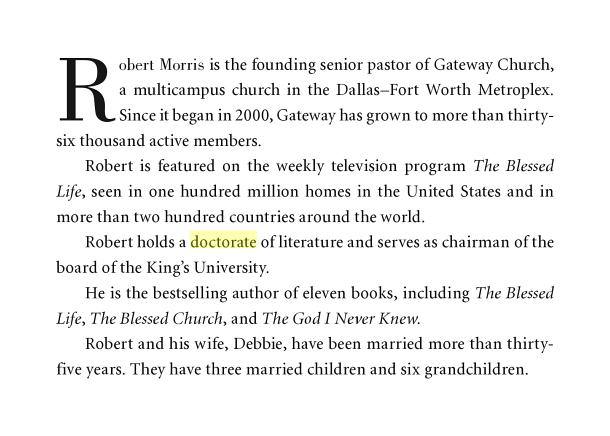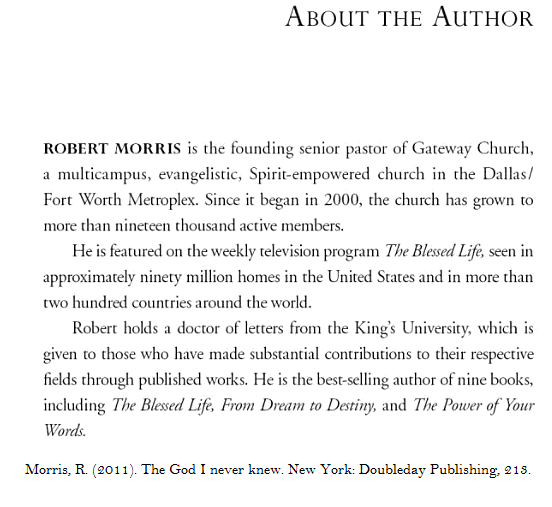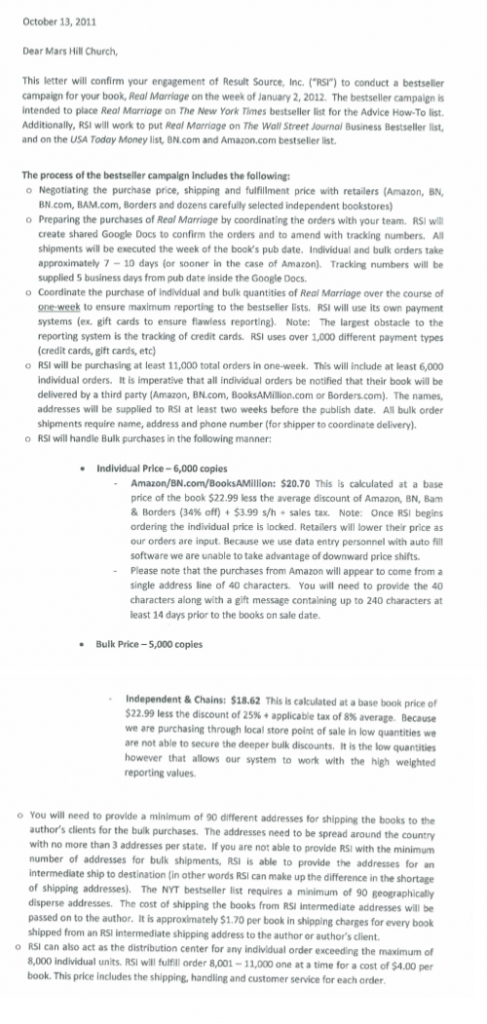Robert Morris has built a megachurch in Southlake Texas which has been rated as the third largest church in America. Given that significant accomplishment, it seems that self-inflation would be unnecessary. However, in his upcoming book published by the Thomas Nelson imprint of HarperCollins Christian, Morris includes a version of his bio which includes a description of a “doctorate of literature” he claims he holds. See below from the upcoming book, Truly Free:

I wrote the church and Thomas Nelson to ask if this “doctorate of literature” was an earned doctorate. Repeated requests were not answered. This “doctorate” is most likely to be an honorary doctorate of letters given to Morris by the small Bible school housed in his church — The King’s University. Morris is currently the chair of the board of the school.
An earlier 2011 bio described Morris’ doctorate as a “doctor of letters” awarded by TKU. This would have been about a year after TKU’s board awarded it to him.

This description of the doctor of letters is closer to the reasons why such honorary degrees are given. However, this bio is still misleading. According to Morris, his main work, The Blessed Life, was ghostwritten. He told his Gateway audience in January of this year that a member of Gateway (David Holland), wrote the book based on on recordings which Morris made in a hotel room. He said the ghostwriter helped him with several books. As it turns out, Morris was given an honorary doctorate for writing books he didn’t actually write.
I understand that many celebrities don’t write their own books, but it is misleading to consider those celebrities to be accomplished writers. They may have good ideas and have enough money to afford to pay a good writer but those books aren’t representative of the author’s writing ability when the listed author didn’t write them.
So in his new book published by Thomas Nelson/HarperCollins Christian (as well as the bio on the church website), Morris claims to hold a doctorate of literature when in fact, he was given an honorary doctorate from his own school for books he didn’t write.
When it was discovered that Mark Driscoll’s book Real Marriage achieved New York Times best seller status via a marketing scheme, Driscoll stopped using “NYTs best selling author” as a description. That was a commendable move. Of course, the proper thing to do for both publisher and author is to present an accurate description to the public.
The ongoing story of Christian authors embellishing their reputations demonstrates the importance Christian leaders place on peripheral persuasion. Perceived expertise is one of several powerful factors operating via the peripheral route to persuasion. Persuasion theory posits two primary routes to persuasion — central and peripheral. In central route strategies, the persuader offers facts and figures with accuracy being important. An assumption is made that the audience is motivated to carefully consider arguments for and against a proposition.
However, in peripheral route strategies, the assumption is that the audience isn’t highly invested in the process but will nonetheless make a decision or render an opinion. Peripheral route tactics influence people to say yes or make a decision for reasons other than the merits of the case. In the situation above, the publisher and author have embellished credentials to communicate expertise in the service of selling books. There may be more personal motives but the effect is that audience members who are motivated by perceived expertise will attribute expertise to Morris due to the embellishments.
Unfortunately, it appears these kind of tactics are embedded features of evangelical and conservative expressions of Christianity.
UPDATE: Just found this article by Phil Cooke on honorary degrees. Bottom line: One should not refer to the degree as if it was earned, or use Dr. in reference to oneself unless one has an earned doctorate.
Tag: HarperCollins Christian
More of the Story Behind the Demise of David Barton's The Jefferson Lies
On his Wallbuilders show last Friday, David Barton belittled the number of Facebook followers Getting Jefferson Right has. I replied:
At the end of the broadcast, the gang makes light of the number of Facebook likes the Getting Jefferson Right page has. How about another comparison with the now pulled from print The Jefferson Lies? How about comparing the number of favorable reviews from actual historians each book has?
In my search, I clicked through to Barton’s effort to answer his critics. The following paragraph caught my eye:
In August 2012, several media outlets reported that Jay Richards, a philosopher and theologian with the Discovery Institute who was also a public endorser of Throckmorton’s book, had asked “10 conservative Christian professors to assess my work.” It was reported that their responses were “negative.” However, some of the ten listed by him had flatly refused to participate in his quest but yet were still listed as providing “negative” responses against me. And in direct conversations I had with Richards after he coordinated these attacks, he openly confessed to me that he knew very little about history. Only four of the ten scholars contacted by Richards actually provided any critiques of my work: Glenn Moots, Glenn Sunshine, Greg Forester, and Gregg Frazer. Of these four, only Frazer specializes in religion and the American founding, but his critique did not even address The Jefferson Lies, and it is not clear that he even bothered to read it. Instead, he watched and criticized a twenty year old video entitled America’s Godly Heritage.
I asked Jay Richards if the claims in this paragraph are accurate. Richards said that he recalled about six written responses from historians with others saying they didn’t have time to do a written review. In other words, they provided reactions but not all were written. None were favorable to The Jefferson Lies. Some who lacked time later commented publicly about Barton’s vision of Jefferson. In an August 2012 World article by Thomas Kidd, Daniel Dreisbach, Kevin Gutzman and James Stoner all disputed Barton’s characterization of Jefferson as being orthodox before 1813. In the paragraph above, Barton minimized the critical reaction to The Jefferson Lies.
Richards agreed that Gregg Frazer’s written submission was about America’s Godly Heritage (I published Frazer’s devastating critique here) but reminded me that Frazer also critiqued an aspect of The Jefferson Lies in World. It also should be noted that America’s Godly Heritage is still for sale on Wallbuilders’ website so Barton’s qualification that the DVD is twenty years old is irrelevant.
Then Richards added something that I don’t think has been reported before. He said:
The entire context is missing from the statement: I contacted a diverse group of scholars with related expertise and clear conservative credentials to ask them their opinion of Barton’s work and The Jefferson Lies in particular. I also asked for written evaluations if possible. The purpose was to compile these and give them to Glenn Beck so he could evaluate them for himself. In the meantime, Thomas Nelson got word of genuine controversy over the book, conducted their own evaluation and pulled the book. This happened before the World article ever came out, and so was not in response to negative media criticism.
Fewer than ten written evaluations from the scholars does not mean the other scholars refused to critique Barton. They did offer Richards feedback and, as noted above, some of them were interviewed by Thomas Kidd for World. Barton’s answer to critics omits this context. Furthermore, Glenn Beck had this feedback and chose to disregard it. He continues to do so, as do other religious right leaders who know about the false historical claims but continue to tout Barton as a respected historian.
Another little known detail about the incident is that Thomas Nelson had pulled the book from publication before World reported on the story. I have learned that the book had been pulled from the publisher’s website at least several days before it was reported in World.
Barton also claims in his response to critics that Simon & Schuster picked up The Jefferson Lies. To date, that publisher has not issued another edition.
From the vantage point of the present, it seems more remarkable than ever that Thomas Nelson pulled The Jefferson Lies from print. Over the last year and a half, we have witnessed publishers stick with authors who have plagiarized material and books with dubious content. For instance, Tyndale House stuck with Kevin Malarkey’s The Boy Who Came Back from Heaven long after the publisher was aware that there were credibility problems with the story. The publisher only pulled the book when the boy who was the subject of the book publicly recanted his story. The Jefferson Lies publisher, Thomas Nelson (now part of HarperCollins Christian), is sticking with similar book Heaven Is for Real and quietly fixed multiple plagiarism problems in Mark Driscoll’s Real Marriage. Even in this publishing environment, Thomas Nelson pulled a best selling book because of their investigation of the facts.
Barton appears to want to change the subject in his reaction to critics by invoking the sale of Thomas Nelson to Rupert Murdoch’s HarperCollins publishing company:
Clearly, Thomas Nelson’s public statements about the reason for pulling the book are incongruous with the above facts, so was there perhaps some other reason behind their announcement? Quite possibly, for only two weeks prior to suddenly dropping The Jefferson Lies, Thomas Nelson had been taken over in an acquisition by Rupert Murdoch and HarperCollins Publishers.
It is hard to know what Barton is implying here. Murdoch is a conservative who founded Fox News, a network which has been generally friendly to Barton’s brand. Given other books HarperCollins Christian offers and has preserved (e.g., Driscoll’s book), it is hard to make a case that the change of ownership had an any effect on the decision to pull the book.
Crossway Books Condemns Manipulation of Bestseller Lists
Monday and Tuesday, I wrote about three Christian authors (David Jeremiah, and Les & Leslie Parrott) who have used help from ResultSource CEO Kevin Small to attain their publishing success. Mars Hill Church’s contract with ResultSource to elevate Mark Driscoll’s book Real Marriage shook public trust in that church. Perry Noble, pastor of New Spring Church, has admitted to using ResultSource to elevate the position of one of his books. There are other authors of books published by Christian publishers who use the ResultSource schemes.
Until recently, ResultSource’s methods were wrapped in mystery. However, with the disclosure of the contract between Mars Hill Church and ResultSource, the public got a look at the service purchased by authors who want New York Times Bestseller status. Essentially the author pays ResultSource to purchase a large quantity of books which ResultSource will send to addresses supplied by the author. If the author doesn’t provide enough addresses in the right geographic areas, then ResultSource will supply them. ResultSource deliberately uses methods which overcome obstacles “to the reporting system” (i.e., deceives the bestseller list). See the excerpt from the contract below for the details.
I asked three Christian publishers — Tyndale House, Harper Collins Christian, and Crossway — for opinions about the use of ResultSource. Tyndale House’s Todd Starowitz told me he would reply when publisher Ron Beers returned from a trip. However, Tyndale did not respond further. HarperCollins Christian did not respond at all. Only Crossway, speaking generally about list manipulation and not individual authors, provided an answer:
From our point of view at Crossway, the bestseller lists are designed to provide an accurate reflection of the market’s response to an author and his or her book. If an author, agent, or publisher intentionally tries to subvert or distort the intended purpose of the bestseller lists, we believe this would constitute an ethical violation, in terms of standard ethical norms, but even more so in terms of Christian ethics. This would be dishonoring to the Lord (to whom we are ultimately accountable), and it would also conflict with our calling to love our neighbors as ourselves (by not creating a distorted or deceptive picture of reality). Christian authors, agents, and publishers are called to a high standard of integrity as we seek to glorify God, not only in the content of what we publish, sell, and market, but also in the way in which we go about this calling.” — Justin Taylor, senior vice president and publisher for books, Crossway
I think Taylor cuts to the heart of the problem with manipulation of bestseller lists. The lists should provide a snapshot of the public response to a book. The public at large seems to see the lists as indicating broad public interest and even quality. However, as it stands, what the list provides is unclear. As the extent of manipulation by Christian and non-Christian authors unfolds, the list may be more of a shadowy glimpse into who has sufficient money to purchase their way into a fiction. Taylor calls the manipulation what it is: unethical. Taylor calls the Christian publishing world to a higher standard. The defense that everybody’s doing it is no defense at all.
Back in June, David Jeremiah’s non-answer to Marvin Olasky’s question about list manipulation provided an insight into another bogus rationale.
Marvin Olasky: TheNew York Times for its bestseller list counts sales from a bunch of secular stores; I understand there’s a company that will go in and buy several books in each of these bookstores. The companies that do that spread the release point of these books that are purchased by individuals so they can get attention. Is that legitimate?
David Jeremiah: The bottom line is you’re selling these books and they’re just not getting noticed. If you want the books to be noticed so that you can reach more people with them, you’ve got to figure out how to do that. I don’t know all of the ramifications of it, but I know that you can’t just write a book and say I’m not going to have anything to do with marketing. If you don’t care enough about it to try and figure out how to get it in the hands of other people, nobody else is going to either.
If you want your books to be noticed, you have to do something about it. It is stunning that David Jeremiah, a man who provides daily bible advice about a host of topics, can say unchallenged that he doesn’t “know all of the ramifications of it.” Dr. Jeremiah, fellow Cedarville University alum, let me ask you to read Justin Taylor’s statement about the ramifications. Let me hasten to add that I don’t know exactly how Jeremiah worked with ResultSource. However, given the direct question about manipulation of sales asked by Olasky, it is disappointing that Jeremiah did not answer it directly.
If he is really unsure of the implications of Olasky’s question, then Dr. Jeremiah should also read Jared Wilson’s article, “What’s Wrong with Buying Your Way onto the Bestseller List. Wilson provided five reasons the practice is wrong:
- It’s dishonest
- It’s egocentric and lazy
- It may eventually harm your reputation and will bug you in the long run
- It’s poor stewardship and bad strategy
- It disadvantages those actually gifted.
See also the comments of the Director of Communications for the New York Times.
At the end of the day, it should not be hard for Christian leaders to understand why fooling the public with a purchased persona is wrong. When Mark Driscoll’s deal with ResultSource came to light, the church initially called it an opportunity, then unwise, then wrong. Eventually Driscoll removed the designation of NYTs best selling author from his bio. What should other authors do who have used this scheme? What should publishers do? At Crossway, there doesn’t seem to be any problem with understanding the ramifications.
Excerpt from the contract between Mars Hill Church and ResultSource. The entire contract is here.

For another inside look at ResultSource in the context of business publishing, see Jeffrey Trachtenberg’s article.